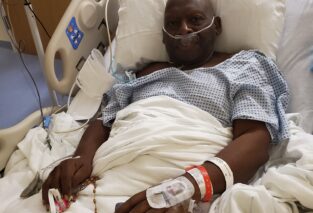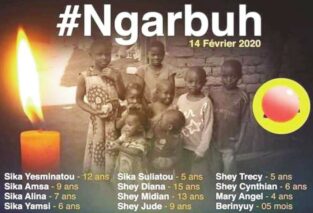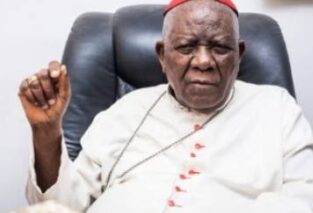In Part I of this reflection, I recalled how complete strangers gave generously of their blood to save my sister, Monica’s life. Several years later, it was my turn to receive the challenge to also give some of my blood to save complete strangers, people I would never meet or know. This was not even in our own land or among our people.
It would be nearly twenty years later, in 1975, that the illness struck again and my sister, Monica, gave up the struggle and answered her Maker’s call to come for her eternal reward. We, however, remained eternally grateful to those who had given generously of their blood that enabled her to survive for so many years the initial crisis.
Three years later, in 1978 that I, in turn, received the challenge to give my blood to save a soul (or souls) I did not know, or would ever know. It came in a very unlikely place and time. I was a student in Paris at the University of Sorbonne Nouvelle, Paris 3, reading for a Master’s Degree in Comparative Literary Studies. A Cameroonian friend of mine and I left our morning class one day and were heading for the underground train station when we saw, parked by the roadside, bearing the unmistakable emblem of the Red Cross, a bus with quite some movement inside and around it.
We could have passed by without a second glance had a certain elegantly and smartly-dressed, medium height woman, of a certain age, wearing a smile that covered her face from ear to ear, not stopped us to ask if we didn’t want to give blood. Her request took me completely aback and, without much reflection on my part, I asked her if they also wanted blood from people like my friend and me. I hadn’t sincerely thought that the French Red Cross would want blood from black people. It’s incredible how much racism you assimilate when you live in a society where you feel the dividing line between races so acutely.
That spunky old woman, who had a lot of life in her, suddenly spun round to face me. The smile had gone from her face and she grabbed me by the arm, looked at me directly in the eye and said: “My son, why do you people, young people, continue to promote this obnoxious exclusiveness. Aren’t we all human beings? Does the blood that flow through your veins have a different colour from the one that flows through mine? Please, my young people, refrain from promoting this division among us. If you don’t feel like giving your blood, I understand, but it shouldn’t be for the reason you evoke here.”
I was taken completely aback by her reaction. I had expected her to turn her back on us and go for the other people of her colour but instead she took time to remind me of the oneness of humanity, and how narrow my own understanding of that humanity was! As I listened to her, I suddenly remembered my sister, Monica. I thought I saw her face at one corner of the sky, nodding to me to give my blood. And I did. I walked up to that bus and my Cameroonians friend, after much hesitation, also followed.
We were greeted by nurses, men and women, dressed in impeccably white gowns, whose reassuring smiles drove away all fear we had of giving our blood. When we told them it was the first time we were giving our blood, they put their hand on our shoulders and commended us for doing such a great gesture. They asked us not to worry and reassured us that all would be over before we knew it; and it was just as they said it would be. A few minutes later, I felt a slight pain as the syringe homed into my vein. I was told to occasionally clench and release my fist as the blood oozed down the tube into a small container beside me.
Twenty minutes, or so later, we were given a cup of warm milk with a piece of bread and then released with many thanks from the nurses. At the foot of the bus, stood the grandmother, who had rebuked me for my comment earlier. She walked up to us and surprised us with big kisses on our cheeks. We walked away feeling that we had achieved something that day. To my Cameroonian friend, it was just one of those adventures one falls into during one’s stay in Europe. To me, however, it was the beginning of what has become a regular exercise I perform for my sister, Monica. Each time I give my blood, I see her there at the corner of my mind, smiling approvingly and I know that I’m doing the right thing.
The Paris Red Cross later sent us certificates as blood donors. I carried mine with me for a good number of years. I later studied at Georgetown University in Washington D.C. before spending a number of years at the University of Alberta in Edmonton Canada. In all these cities I was generous with my blood, and no one turned it down because it came from a black man.
Blood donor No B298
I came back home in the early 1980s and have since settled in Douala. I have continued the practice of donating my blood. In fact, I am blood donor No B298 of the Laquintinie Blood Bank. I always answer present whenever I receive a call telling me that someone needs my blood. I always give it as if I’m giving it to my sister, Monica. I was too young at the time she needed blood but someone, nay some people, gave her their blood and with it, a new lease of life for several years thereafter.
Some months ago, I was asked to give blood to someone who was at the terminal stage of life. He was ill of cancer and the blood I and others gave was not to save his life, for the doctors said he barely had a few months to survive, but he didn’t even survive a few weeks. We gave him blood to ease the atrocious pains he was feeling. Our blood helped give him a respite and help prepare him for death without too much agony. There too, I believe my blood went to a worthy cause. It may not save a life, but it soothes a soul that is on its way to its Maker. What can be more dignifying than to help a man or woman to die in dignity? I wonder.
In the last part of on my write-up on blood donation, I bow my head in tribute to the victims of the recent Kenya Airways plane crash in our country that led to the disappearance of blood from the Laquintinie Blood Bank in Douala. Read on.


